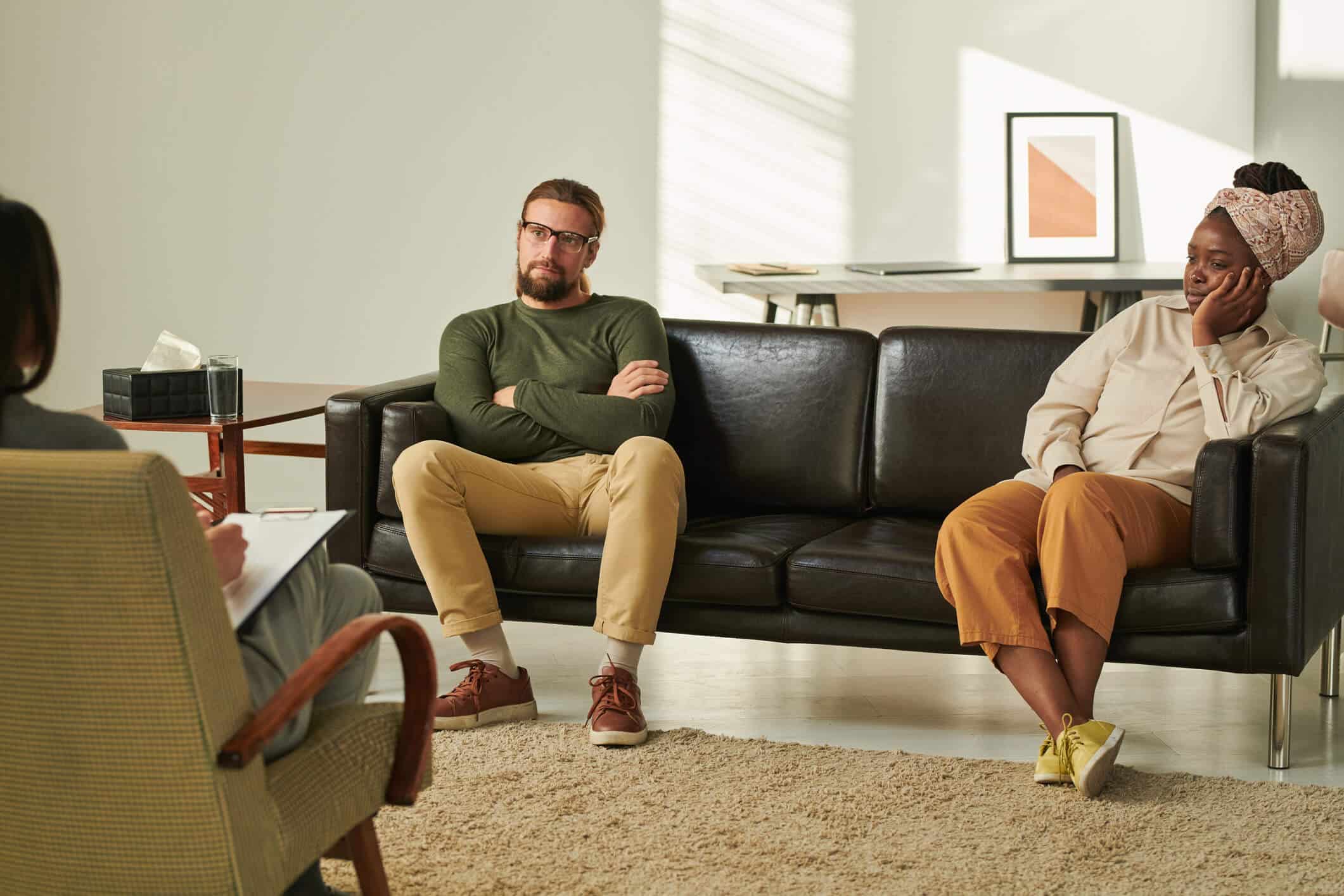Becoming a therapist can be a long and challenging process, often requiring significant commitment and study. Due to the requirements to become a therapist, prospective students may wonder which higher education institutions are best for getting a degree in psychology, counseling, or other behavioral health specialties. Whether you’re getting your bachelor’s, master’s, or doctorate, there are a few schools to keep in mind. Keep reading to learn more about these institutions and explore which one could be the right fit for you.
How To Become A Therapist: Educational Requirements
Becoming a therapist typically requires at least a master’s degree in psychology or another counseling-related field. However, some psychology majors go on to earn a doctorate, like a Ph.D. or PsyD degree.
To start your educational journey, you must apply to an accredited college for a bachelor’s program in psychology, social work, or another human sciences area. After achieving your bachelor’s degree, you can apply to master’s programs, which are typically around two years in length and involve an internship and practicum. After achieving your master’s degree, you may be required to work as a supervised counselor with a limited license, depending on your state.
If you choose to work as a therapist with a master’s degree only, you can get your full license after fulfilling the licensing requirements for your state, which may involve a certain number of supervised practice hours and an internship. However, if you are going on to become a psychologist or psychiatrist, your educational path may look different. Ph.D. programs for psychologists are generally two to four years in length and may involve a specialty in a particular realm of psychology, such as research.
Psychiatrists are not therapists but medical doctors and must attend medical school after achieving a master’s degree. Medical school is four years in length and ends in a residency, which may be two to four years extra. After residency and licensure, psychiatrists can practice privately or publicly and offer mental health support through medication management, therapy, psychological testing, and other services.
Best Psychology Colleges In The Ivy League For Therapists
Regarding Ivy League schools, the following universities have been highly rated for their undergraduate, graduate, and Ph.D. psychology programs. They are often ranked as the best schools in the country for those studying psychology, communication skills, and neuroscience.
- Harvard University
Location: Cambridge, Massachusetts
Graduation Rate: 97.1%
Acceptance Rate: 6%
Psychology Program Rating: 90/100
Harvard University is one of the top esteemed schools in the country, with a low acceptance rate due to its stringent application process and requirements. Harvard offers bachelor’s, master’s, and doctorate degrees in psychology with a competitive psychology program.
Psychology was first practiced and taught at Harvard in the 1800s by William James, a prominent psychologist of his time. BF Skinner, George Miller, and Henry Murray are other psychologists who studied at this school.
Harvard’s graduate program focuses on four research programs: cognition, brain and behavior, developmental psychology, social sciences, and clinical science. Harvard’s Ph.D. program offers specialization in the following areas:
- Experimental psychopathology and clinical science
- Developmental psychology
- Social psychology
- Cognition, brain, and behavior (CBB)
If you are interested in the Harvard doctoral program in psychology, you can check the Harvard Griffin GSAS Admissions website for more information on requirements for applications, test scores, and deadlines.
- Yale University
Location: New Haven, Connecticut
Graduation Rate: 97%
Acceptance Rate: 5%
Psychology Program Rating: 94/100
Yale University is considered by some sources the best Ivy League school for psychology. It offers online and in-person psychology degrees and has an admission rate of 5%. They offer graduate programs in the following areas:
- Clinical psychology
- Cognitive psychology
- Developmental psychology
- Neuroscience
- Social and personality psychology
Yale’s graduate program is one of the best in the country, often rated higher than its undergraduate options. If you plan to apply to the Yale graduate program, they require you to check whether the graduate advisors are accepting new students for the coming school year.
For an undergraduate degree in psychology at Yale, psychology students are required to take 12 specialized courses beyond their prerequisite requirements and general education courses. Yale also offers a “neuroscience track” for those hoping to enter the Yale neuroscience graduate program.

- Princeton University
Location: Princeton, New Jersey
Graduation Rate: 98%
Acceptance Rate: 4%
Psychology Program Rating: 91/100
Princeton University has also been rated highly for its Ph.D. program in psychology. One of the benefits of attending this school is its expensive and high-tech facilities and equipment, which are often noted as some of the best in the country. Princeton has two high-field fMRI scanners, high-density scalp EEG systems, and multiple computing facilities. Becoming a student at Princeton may be particularly valuable for those looking to enter research psychology.
Undergraduate students at Princeton can earn a bachelor’s in psychology from the Division of Natural Sciences. Courses include topics like sensation, perception, decision-making, and social interaction. The psychology concentration at Princeton requires at least eight psychology-specific courses and three prerequisite courses.
Best Non-Ivy League Schools For Therapists
As getting into Ivy League schools can be challenging for many, non-Ivy League schools offer comparable psychology programs, including the following.
- Stanford University
Location: Stanford, California
Graduation Rate: 94%
Acceptance Rate: 4%
Psychology Program Rating: 100/100
Stanford University is often considered the best university in the country for psychology students due to its competitive psychology program. The university offers undergraduate, graduate, and doctoral degrees to students focusing on the most modern and groundbreaking research in psychology worldwide.
For graduate and doctoral students, the following areas can be specialized in:
- Affective psychology
- Cognitive psychology
- Developmental psychology
- Neuroscience
- Social psychology
A unique feature of Stanford’s undergraduate program is that students can participate in the Undergraduate Psychology Association (SUPA), which allows them to be involved with ongoing research. Research programs are often limited to graduate students at other schools, so this program lets students get a head start in their studies.
- University of California-Berkeley
Location: Berkeley, California
Graduation Rate: 93%
Acceptance Rate: 14%
Psychology Program Rating: 90/100
The University of California-Berkeley has offered psychology degrees for over 100 years. The psychology department at this university has been a leader in psychological research throughout the last century, ranked high on lists of the best schools for therapists in the country, often next to or near Stanford and Yale.
Berkeley offers both undergraduate and graduate degrees in psychology. The undergraduate program focuses on six areas of research, including the following:
- Behavioral and systems neuroscience
- Clinical science
- Cognitive neuroscience
- Social-personality psychology
- Developmental psychology
- Cognition psychology
They only require one prerequisite for the psychology program: Psychology 101 (general psychology). Afterward, students must complete courses in research methods, beginner psychology, and tier-two psychology topics.
The graduate program at Berkeley focuses heavily on research and technology, encouraging students to take courses outside of the psychology program. This school may be best for those looking to involve STEM concepts in their work, as it is a STEM-focused school. Application requirements involve GRE scores, GPA, transcripts, a resume, a personal statement, and letters of recommendation.
- Vanderbilt University
Location: Nashville, Tennessee
Graduation Rate: 93%
Acceptance Rate: 7%
Psychology Program Rating: 85/100
The Vanderbilt Department of Psychology offers undergraduate and graduate degrees. The program is focused on three major areas, including the following:
- Clinical science
- Cognition and cognitive neuroscience
- Neuroscience
Vanderbilt is often considered a prestigious university for those going into psychiatry or research psychology. However, therapists can also earn a degree from this school. The undergraduate major is a bachelor’s in psychology, and the graduate program can focus on psychological sciences, neuroscience, medicine, health, and society or the Peabody College’s cognitive studies program.
- University of Pennsylvania
Location: Philadelphia, Pennsylvania
Graduation Rate: 96%
Acceptance Rate: 6%
Psychology Program Rating: 89/100
The University of Pennsylvania offers undergraduate and graduate degrees in psychology and is one of the top psychology programs in the country. A psychology major in the undergraduate department requires 13 psychology-related credits and a minimum 2.0 GPA. In addition, a prerequisite to the course is the Introduction to Experimental Psychology course.
Penn’s graduate program focuses on research accomplishments and clinical training in counseling. Students can partake in seminars, teaching, and team activities. In addition, the faculty is highly involved in the lives of graduate students, offering support and advice throughout the two-year program.
Training programs in the graduate program at Penn include the following:
- Clinical psychology
- Vision training programs
- Joint JD/Ph.D.
- Joint Ph.D. marketing and psychology programs
- MD and Ph.D. programs
- Integrative language science and technology

Best Online Schools For Therapists
Psychology degrees can often be obtained online for those who don’t have time for an in-person program due to work, family life, or other obligations. The following universities are typically highly rated for their online psychology programs:
- Oregon State University
- Lesley University
- Prescott College
- Arizona State University
- Southern New Hampshire University
- Capella University
- Liberty University
- Franklin University
- University of Florida
How To Choose A University
When looking for a university for an undergraduate or graduate degree, it can be helpful to keep the following questions in mind:
- Do you want a research or clinical-focused program?
- What is the acceptance rate of the school?
- What jobs do alums often go on to receive after graduation?
- Do you want to practice privately or publicly?
- What are your future education goals?
- What are the licensure requirements for practice?
- Does your school of choice offer a practicum or internship in line with your state’s licensure requirements?
If you attend a program that does not offer the hour requirements for your state licensure, you may be required to take extra courses. Upon enrollment, check with your school advisor to see how you can meet these requirements, especially if your school is out of state.
Online Therapy
Whether you’re exploring your career path as a therapist or are trying to choose a program or school that’s right for you, guidance and support from an online professional could be useful. BetterHelp is an online therapy platform boasting thousands of licensed therapists. You can connect with a provider through video chats, phone calls, or in-app messaging to discuss whatever may be on your mind. Being able to speak with someone who has likely gone down a path like the one you may be about to take could be beneficial. Their knowledge and support could serve as an instrumental resource during your professional journey.
The Efficacy Of Online Therapy
Future therapists and other professionals may face pressure as they attempt to choose their career path or pick an educational program. For these concerns and more, online therapy could be helpful. In a 2019 study, researchers explored the effectiveness of an online career counseling intervention by assigning 30 students to either an online counseling or control group. They found that participants in the online group demonstrated higher levels of assuredness when making decisions about their careers. Further, in the intervention group, students with higher hardiness and psychological capital had higher scores on career decision-making, speaking to the gravity of mental well-being when making important choices.
Takeaway
Finding a university or college for a psychology program can be difficult. Still, many schools within the US have been rated the “best of the best” for emerging psychologists and therapists.
Even if you don’t get into these schools or can’t afford a high-ranking college, a psychology degree from any institution can lead to career success. People from all educational backgrounds have gone on to succeed in their careers and publish high-ranking research. What may matter most is your passion for the field and the effort you put toward your studies. If you’d like guidance in your career journey or need help picking a program that’s right for you, consider connecting with a licensed therapist through a platform like BetterHelp.



